The Link Between Anxiety, Co-Dependency, and Natural Support
Introduction
Anxiety and co-dependency are deeply intertwined. They feed each other like two sides of the same coin—one fueling fear, the other fueling over-attachment. People who struggle with co-dependency often live in a state of quiet panic: a constant scanning for signs of disapproval, distance, or abandonment. Their nervous systems stay locked in fight-or-flight, unable to fully relax.
But beneath the behaviors of caretaking, people-pleasing, or over-thinking lies something more biological. Co-dependency and anxiety both stem from nervous system dysregulation, imbalanced neurotransmitters, and chronic stress chemistry. The good news? These patterns can be softened—naturally—through lifestyle habits, emotional healing, and targeted nutritional support.
This article dives deep into the brain-body connection behind anxiety and co-dependency, and how natural methods can help you calm the storm inside. 🌸
Looking for supplements for This? Click here.
Understanding the Connection Between Anxiety and Co-Dependency 🧠💔
At its core, co-dependency is about fear—the fear of losing love, approval, or safety. Anxiety is that fear translated into body language: racing heart, tight chest, sleepless nights, and a mind that won’t stop spinning.
Co-dependent patterns form early in environments where love felt conditional. As a child, if you had to perform, please, or protect others to receive affection, your brain learned that connection equals effort and vigilance. Over time, this hyper-vigilant state becomes your “normal.”
The brain’s alarm system—the amygdala—stays overactive, constantly watching for cues of rejection or danger. The prefrontal cortex, which helps regulate logic and emotion, takes a backseat. This neurological imbalance keeps you anxious, reactive, and hypersensitive to others’ moods.
When anxiety and co-dependency merge, the mind turns every silence into a threat, every delay into rejection. You start managing everyone’s feelings just to quiet your own nervous system.
The Chemistry of Anxiety and Attachment 🌩️

Anxiety and co-dependency both stem from biochemical imbalances that keep your nervous system in overdrive. Let’s break down the key players involved.
Cortisol and adrenaline: These stress hormones are released by the adrenal glands whenever you sense threat—real or imagined. In co-dependency, the “threat” isn’t physical danger but emotional distance or disapproval. When cortisol stays elevated for too long, it leads to fatigue, irritability, and emotional volatility.
Dopamine: The reward chemical that drives motivation and pleasure. In healthy relationships, dopamine is released through mutual affection and stability. But in co-dependency, dopamine becomes tied to unpredictability—your brain feels most alive when it’s chasing approval or trying to fix problems.
Serotonin: The neurotransmitter of calm and confidence. Low serotonin leads to anxiety, insecurity, and obsessive thinking. It’s common in people who rely on others for emotional regulation.
GABA: The brain’s “off switch.” It helps slow down racing thoughts and soothe an overactive nervous system. Low GABA makes it nearly impossible to relax. Many co-dependent individuals have low GABA from chronic stress.
Oxytocin: The bonding hormone that creates feelings of love and trust. Ironically, oxytocin can reinforce unhealthy attachment when it’s linked to inconsistent or toxic relationships.
Together, these chemicals form a loop: fear lowers serotonin, stress raises cortisol, and every emotional high or low keeps dopamine unstable. The result is a nervous system constantly swinging between craving connection and fearing loss.
The Nervous System in Survival Mode ⚡
The autonomic nervous system has two main modes:
🌞 The sympathetic system (fight-or-flight), which activates during stress or danger.
🌙 The parasympathetic system (rest-and-digest), which calms and restores.
In anxiety-driven co-dependency, the sympathetic system stays “on.” Even small cues—a sigh, a text delay, a change in tone—can activate the same physiological response as real danger. Your heart races, your stomach tightens, and your breathing becomes shallow.
Over time, this chronic activation leads to dysregulation. You might feel constantly on edge (hyperarousal) or emotionally flat and detached (hypoarousal). These states alternate unpredictably, leaving you exhausted.
The nervous system learns through repetition. The more it experiences stress in relationships, the more it associates love with vigilance. That’s why healing requires both emotional awareness and physical calming. You can’t think your way out of a dysregulated system—you must re-train it through safety, breath, and nourishment. 🧘
How Emotional Exhaustion Takes Hold 🌧️
The co-dependent person rarely rests. Their minds run on a loop of questions: Did I do something wrong? Did I upset them? How can I fix this?
This constant emotional labor drains the body. Cortisol remains high, sleep quality drops, digestion slows, and inflammation increases. Eventually, the adrenal system—responsible for managing stress hormones—burns out.
You might recognize it as:
😴 chronic fatigue even after sleep
💭 foggy concentration and forgetfulness
💔 feeling numb or detached
🔥 muscle tension or migraines
💫 sudden emotional crashes after intense giving
These symptoms aren’t “in your head.” They’re the physical manifestation of long-term hyper-vigilance.
The first step toward recovery is recognizing that emotional exhaustion is a body condition, not a character flaw.
Natural Support for Calming the Co-Dependent Nervous System 🌿
Healing anxiety and co-dependency requires both psychological work and biochemical support. While therapy, boundaries, and emotional awareness are vital, the nervous system also needs nutritional stability and neurochemical repair.
Here are natural methods that complement emotional healing and help the body return to balance.
🌸 Magnesium: The Relaxation Mineral
Magnesium is one of the most powerful natural tranquilizers for the nervous system. It supports over 300 biochemical reactions in the body, including the regulation of cortisol and the activation of GABA receptors.
When magnesium is low, the body becomes tense, restless, and prone to panic. Replenishing it helps quiet the mind, ease muscle tension, and improve sleep.
The most calming forms are magnesium glycinate and magnesium threonate, both known for their gentle absorption and brain benefits.
🍵 L-Theanine: Calm Without Sedation
Found in green tea, L-Theanine increases alpha brain waves—those associated with relaxed focus and creativity. It naturally boosts GABA, serotonin, and dopamine levels, creating a state of “calm clarity.”
For people who overthink or spiral in anxiety, L-Theanine can be a lifesaver. It helps you feel grounded without making you sleepy or dull.
🌾 Ashwagandha: The Stress Regulator
Ashwagandha is an adaptogenic herb that reduces cortisol while stabilizing energy. It helps rebuild stress tolerance, improves mood, and balances hormones linked to anxiety.
In co-dependency recovery, it provides a sense of inner steadiness—helping you remain calm even when relationships feel uncertain.
🌿 Rhodiola Rosea: The Burnout Buffer
Rhodiola supports dopamine and serotonin balance while reducing mental fatigue. It increases emotional resilience and helps regulate energy swings.
If you feel drained from constantly giving or managing others’ emotions, Rhodiola helps your body adapt and maintain stability.
🌻 Omega-3 Fatty Acids: Brain Nourishment
The brain is made largely of fat, and omega-3 fatty acids (EPA and DHA) are critical for neuron communication. They improve dopamine and serotonin receptor function and reduce inflammation linked to mood disorders.
When your brain’s membranes are healthy, emotional regulation becomes easier. You can respond rather than react.
🌙 5-HTP and Tryptophan: Serotonin Builders
These natural precursors help your body produce serotonin, the neurotransmitter of peace. 5-HTP (from the Griffonia seed) can ease anxiety, enhance sleep, and reduce obsessive thought loops.
Taken in the evening, it supports serotonin synthesis and gently promotes better rest.
🌼 B-Complex Vitamins: The Energy Restorers
Stress depletes B-vitamins, which are crucial for neurotransmitter production and nervous system stability. B6, B9, and B12 especially support serotonin and dopamine synthesis.
Supplementing with a high-quality B-complex replenishes what chronic stress has drained, restoring focus and emotional endurance.
🧘 Probiotics and Gut Support
The gut produces around 90% of your serotonin. Chronic stress disrupts gut flora, leading to poor digestion and mood instability. Probiotics like Lactobacillus rhamnosus and Bifidobacterium longum have been shown to reduce anxiety and improve stress resilience.
Pair probiotics with prebiotics (fiber-rich foods like oats, bananas, and leafy greens) to fuel healthy bacteria and stabilize the gut-brain axis.
Looking for supplements for This? Click here.
Mind-Body Practices to Reinforce Balance 🌈
Supplements work best when combined with daily regulation rituals. These habits teach your body that safety doesn’t depend on external control—it can exist right here, within you.
🌬️ Breathwork: Slow, deep breathing (especially longer exhales) activates the parasympathetic system, lowering cortisol and heart rate.
Want to try Breathwork? Click Here.
🧘 Yoga or Stretching: Movement releases tension stored in the muscles and balances neurotransmitters like GABA and serotonin.
🌿 Grounding: Spend time outdoors, feel the ground beneath your feet, and let nature recalibrate your nervous system.
💤 Consistent Sleep: Deep rest repairs neurotransmitter function and rebalances circadian rhythms, essential for emotional regulation.
🌸 Self-Compassion: Speaking gently to yourself rewires the emotional brain faster than self-criticism ever could.
Relearning Safety From the Inside Out 💫
Healing anxiety within co-dependency isn’t about learning to care less—it’s about learning to feel safe in your own body. For years, your nervous system may have equated peace with danger, silence with rejection, and love with control.
When you begin to calm your body, the mind starts to follow. Supplements and nutrition restore the physical foundation of balance, while therapy, mindfulness, and boundaries rebuild emotional safety.
In time, you stop chasing calm and begin embodying it. You no longer absorb everyone else’s energy; you hold your own.
And when your nervous system feels safe, connection becomes a choice—not a compulsion. 💛
Looking for online therapy ? Click Here.
References 📚
Porges, S. W. (2011). The Polyvagal Theory: Neurophysiological Foundations of Emotions, Attachment, Communication, and Self-Regulation.
Sapolsky, R. M. (2004). Why Zebras Don’t Get Ulcers. Henry Holt & Company.
Panossian, A., & Wikman, G. (2010). Adaptogens in stress and fatigue. Phytomedicine.
Kennedy, D. O. (2016). Cognitive function, brain energy, and nutritional influences. Nutrition Reviews.
Cryan, J. F., & Dinan, T. G. (2012). Mind-altering microorganisms: The impact of the gut microbiota on brain and behavior. Nature Reviews Neuroscience.
van der Kolk, B. A. (2014). The Body Keeps the Score: Brain, Mind, and Body in the Healing of Trauma.
Related Posts
-
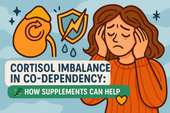
Cortisol Imbalance in Co-Dependency: How Supplements Can Help
Cortisol is the body’s main stress hormone—essential for energy and focus, yet harmful when chronically elevated. When life feels like constant pressure, cortisol imbalance can trigger fatigue, anxiety, and mood swings. Learning how to restore balance through rest, nutrition, and the right supplements can help you rebuild calm, clarity, and resilience from the inside out. 🌿💫
-
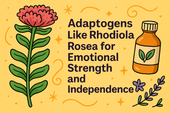
Adaptogens Like Rhodiola Rosea for Emotional Strength and Independence
Adaptogens are nature’s stress-balancing herbs—plants like Rhodiola, Ashwagandha, and Holy Basil that help your body adapt to emotional and physical pressure. They don’t numb or overstimulate; they teach your system how to find calm and stability again. By restoring balance to your hormones, energy, and mood, adaptogens nurture emotional resilience and grounded strength. 🌿✨
-
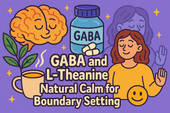
GABA and L-Theanine: Natural Calm for Boundary Setting
Anxiety can feel like a storm inside your mind—constant tension, overthinking, and the inability to relax even when you’re safe. But beneath the chaos, your body is simply trying to protect you. Learning to calm anxiety starts with understanding how your brain and nervous system respond to stress—and how to gently guide them back to peace. 🌿💫
-
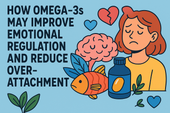
How Omega-3s May Improve Emotional Regulation and Reduce Over-Attachment
Inflammation isn’t just about sore joints or fatigue—it’s also a hidden driver of mood swings, anxiety, and emotional burnout. When chronic stress or poor diet keep the body inflamed, the brain’s chemistry changes, making calm harder to access. Learning how to reduce inflammation through nutrition, rest, and mindful living helps restore balance from the inside out. 🌿💫
-
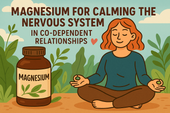
Magnesium for Calming the Nervous System in Co-Dependent Relationships
The nervous system is the body’s communication network, linking your mind and organs through a delicate web of electrical signals. It controls everything from emotional responses to muscle movement—and when it’s overwhelmed by chronic stress or anxiety, balance is lost. Learning how to calm and nourish your nervous system through nutrition, mindfulness, and rest can restore peace and emotional stability. 🌿💫
-
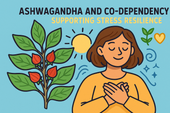
Ashwagandha and Co-Dependency: Supporting Stress Resilience
Stress is more than a feeling—it’s a full-body signal that your system is overwhelmed. When the mind races and the body tenses, your hormones, breathing, and focus all shift into survival mode. Chronic stress doesn’t just affect emotions—it reshapes your nervous system, drains your energy, and clouds your clarity. Learning to understand and manage stress gently is the first step toward peace, balance, and true recovery. 🌿💫
-

Why Co-Dependency Feels Draining: Adrenal Fatigue and Supplements That Help
The adrenal glands are small but powerful organs that sit above your kidneys, acting as your body’s built-in stress managers. They produce hormones like cortisol and adrenaline that help regulate energy, mood, and resilience. When they’re overworked from chronic stress or emotional exhaustion, fatigue and imbalance follow. Supporting adrenal health naturally can help restore calm, energy, and hormonal balance. 🌿⚡
-

Supplements That Support Dopamine and Serotonin in Co-Dependent Patterns
Serotonin is the neurotransmitter of calm, confidence, and contentment. When it’s balanced, you feel peaceful and emotionally grounded. When it’s low, anxiety, mood swings, and emotional dependence take over. By understanding serotonin’s role in emotional health—and how to support it naturally—you can rebuild inner stability, improve relationships, and cultivate lasting happiness from within. 🌞💫
-

How Emotional Exhaustion in Codependency Impacts the Nervous System
The nervous system is the body’s communication network, connecting the brain to every organ and muscle. It regulates stress, mood, and emotion through a delicate balance of electrical and chemical signals. When overwhelmed, it can become dysregulated—leading to fatigue, anxiety, and emotional imbalance. Understanding how to calm and strengthen the nervous system is key to healing from chronic stress and emotional burnout. ⚡🌿
-

What Is Co-Dependency? The Role of Brain Chemistry and Stress
Stress is more than a feeling—it’s a full-body experience that begins in the brain and ripples through every cell. When cortisol surges and the nervous system stays on alert, your body can’t rest or recover. Over time, this constant tension affects energy, focus, mood, and even immune health. Understanding stress chemistry is the first step toward breaking free from burnout and finding calm again. 🌿
-

Creating a Supplement Stack for Motivation, Energy, and Anti-Procrastination
Motivation is the fuel behind every meaningful achievement—but it’s not just about willpower. It’s a mix of mindset, brain chemistry, and momentum. When energy, focus, and purpose align, action feels natural instead of forced. Learn how to harness motivation as a daily state, not a fleeting feeling.
-

Supplements for Building Consistency and Reducing Chronic Procrastination
Biochemistry is the bridge between biology and chemistry—the science of life at the molecular level. It explains how nutrients, hormones, and neurotransmitters interact to create energy, thought, and emotion. From brain function to muscle movement, biochemistry reveals the invisible processes that sustain health, balance, and vitality.
-

GABA and Procrastination: Supporting Calm Focus for Productivity
GABA is the brain’s natural calming messenger—a neurotransmitter that helps slow mental overactivity and ease stress. When GABA levels drop, focus fades, anxiety rises, and procrastination becomes more likely. By supporting GABA through nutrition, lifestyle, and supplements, you can restore calm clarity, improve focus, and take action with steady, balanced energy.
-

Ashwagandha and Procrastination: Lowering Stress to Improve Action
Science is the language of curiosity and discovery. It helps us understand the hidden patterns behind life, energy, and the universe. Through experimentation and critical thinking, science connects imagination to evidence—turning questions into knowledge. Whether through microscopes, molecules, or minds at work, science represents our endless pursuit of truth and innovation.
-

Neurotransmitters and Motivation: Supplements That Support Drive and Focus
Supplements can do more than boost physical health—they can also enhance mental clarity, focus, and motivation. Nutrients like omega-3s, magnesium, B vitamins, and adaptogens help balance neurotransmitters, stabilize mood, and support brain energy. When combined with good sleep, nutrition, and mindful habits, they can transform how your brain performs under stress.
-

How Stress Hormones Like Cortisol Fuel Procrastination (and What Helps)
Blood sugar isn’t just about physical health—it directly impacts focus, mood, and motivation. When glucose levels spike and crash, energy and attention do the same, fueling procrastination and brain fog. Learning how to stabilize blood sugar through balanced meals, mindful habits, and key nutrients helps keep your mind steady, focused, and ready to act.
-

Brain Fog and Procrastination: Supplements for Mental Clarity
Brain fog can turn even simple tasks into mental hurdles. When your thoughts feel slow and unclear, procrastination often follows—making focus and productivity seem impossible. This article explores the biochemical and lifestyle causes of brain fog and reveals the most effective supplements for restoring mental clarity, focus, and sustained energy.
-

The Link Between Low Energy and Procrastination: Can Supplements Help?
Neurochemistry shapes how we think, feel, and act. When neurotransmitters like dopamine, serotonin, and GABA fall out of balance, it can lead to fatigue, anxiety, or lack of motivation—fueling procrastination and low mood. Understanding the brain’s chemical communication system helps us find ways to restore focus, calm, and emotional stability through nutrition, mindfulness, and targeted supplements.
-

Why Do We Procrastinate? The Role of Dopamine and Supplements That Support It
Dopamine is the brain’s motivation messenger—the chemical that fuels focus, reward, and drive. When dopamine levels drop, even simple tasks can feel impossible to start. This article explores how dopamine shapes procrastination, motivation, and mental energy, along with natural supplements and daily habits that help restore balance and get things done.
-

Phosphatidylserine and Stress Reduction for People with BDD
Stress is more than a mental state—it’s a full-body experience that affects hormones, brain chemistry, and emotional balance. For people with Body Dysmorphic Disorder (BDD), constant tension and worry about appearance can overload the nervous system. Learning how stress works and finding ways to calm it is key to breaking the cycle of anxiety and self-criticism.
-

How Antioxidants Like Vitamin C & E Support Mental Health in BDD
Antioxidants are the body’s natural defense against stress and inflammation. For people with Body Dysmorphic Disorder (BDD), oxidative stress can worsen fatigue, anxiety, and emotional imbalance. Nutrients like Vitamin C and E help protect brain cells, boost neurotransmitter function, and support a calmer, clearer mindset—building a stronger foundation for recovery.
-

Ginkgo Biloba and Memory Support for BDD Recovery
Emotional regulation is the foundation of healing from Body Dysmorphic Disorder (BDD). When the nervous system stays in constant overdrive, even small stressors can trigger self-critical spirals. Learning to calm emotional reactivity helps restore clarity, confidence, and a sense of inner balance. By blending mindfulness, nervous system support, and self-compassion, you can retrain your brain to respond—not react—to emotion.
-

Alpha GPC and Cognitive Function in Body Dysmorphic Disorder
Mental fatigue can feel like your brain has hit a wall—thoughts slow down, focus fades, and motivation disappears. For people with Body Dysmorphic Disorder (BDD), chronic overthinking, emotional stress, and constant self-evaluation can deplete mental energy even further. Understanding what causes this cognitive exhaustion is the first step toward recovery—through rest, balanced nutrition, and targeted brain-supporting supplements.
-

N-Acetyl L-Tyrosine and BDD: Supporting Mental Clarity
Chronic stress doesn’t just affect your mood—it reshapes your brain chemistry, weakens focus, and fuels the obsessive thought loops common in Body Dysmorphic Disorder (BDD). Over time, constant cortisol elevation drains mental energy and emotional balance. Learning to recognize and manage chronic stress is essential to restoring mental clarity, self-compassion, and resilience.
-

Chamomile and Lavender for Calming Obsessive Body Image Thoughts
The nervous system is the command center of our emotional and physical world—and in Body Dysmorphic Disorder (BDD), it often operates in overdrive. Understanding how the brain and body communicate under stress reveals why intrusive thoughts feel uncontrollable. Learning to regulate the nervous system through calm practices, nutrition, and supplements helps restore inner balance and emotional safety.
-

Adaptogens for Body Dysmorphic Disorder: Rhodiola, Ginseng, and More
Rhodiola rosea, often called the “golden root,” is an adaptogenic herb renowned for boosting stress resilience and mental endurance. For individuals with Body Dysmorphic Disorder (BDD), Rhodiola may help reduce fatigue, regulate cortisol, and enhance emotional balance. By supporting both mind and body, this powerful plant promotes calm focus, improved mood, and renewed energy to face daily challenges.
-

B Vitamins for Stress Resilience in BDD: Rebuilding Calm from Within
Biochemistry is at the heart of every thought, emotion, and reaction we experience. In Body Dysmorphic Disorder (BDD), chemical imbalances in neurotransmitters like serotonin, dopamine, and GABA can amplify stress and distort self-perception. Understanding the biochemistry behind mood and stress regulation offers a path toward healing—bridging the gap between emotional experience and the body’s molecular balance.
-

Melatonin and Body Dysmorphic Disorder: Restoring Healthy Sleep Patterns
Melatonin, the body’s natural sleep hormone, plays a vital role in helping people with Body Dysmorphic Disorder (BDD) restore healthy sleep cycles. When anxiety and obsessive thinking interfere with rest, melatonin levels often drop, leading to more emotional reactivity and distorted self-perception. This article explores how melatonin works, why BDD disrupts it, and how natural supplementation—combined with mindful routines—can help the brain and body finally find calm at night.
-

Sleep Struggles with BDD: Supplements for Rest and Recovery
When you’re living with Body Dysmorphic Disorder (BDD), restful sleep can feel impossible—but the right supplements can help reset your body’s natural rhythm. From magnesium and L-theanine to 5-HTP and ashwagandha, these nutrients support relaxation, lower cortisol, and enhance melatonin production. This article explores how supplements can calm the mind, ease nighttime anxiety, and promote true restorative sleep for emotional and physical recovery.
-

5-HTP and Serotonin Balance: Could It Help with Body Dysmorphic Disorder?
Anxiety can feel like a storm inside the mind—restless, overwhelming, and hard to control. In people with Body Dysmorphic Disorder (BDD), anxiety often fuels obsessive thoughts and self-criticism, creating a painful cycle of worry and self-doubt. This article explores the biological roots of anxiety, the role of neurotransmitters like serotonin and GABA, and how natural strategies such as mindfulness, supplements, and nervous system regulation can restore calm and mental clarity.
-

Can Ashwagandha Help Ease Stress and Anxiety in Body Dysmorphic Disorder?
Neurotransmitters like serotonin, dopamine, GABA, and acetylcholine are the chemical messengers that shape how we think, feel, and react to stress. In Body Dysmorphic Disorder (BDD), imbalances in these neurotransmitters can amplify anxiety, obsessive thinking, and emotional distress. This article explores how restoring healthy brain chemistry through nutrition, supplements, and mindfulness can help bring clarity, calm, and emotional stability.
-

L-Theanine for BDD: Finding Calm in the Mind
Neurochemistry plays a central role in how we think, feel, and see ourselves. For those living with Body Dysmorphic Disorder (BDD), imbalances in neurotransmitters like serotonin, dopamine, and GABA can intensify anxiety, obsessive thoughts, and emotional distress. This article explores how regulating brain chemistry through supplements, mindfulness, and lifestyle changes can bring the nervous system back into harmony and restore inner calm.
-

Omega-3 Fatty Acids and Body Image Disorders: Supporting Emotional Health
Omega-3 fatty acids do far more than support heart health—they nourish the brain, stabilize mood, and may ease the emotional turbulence tied to body image disorders like BDD. This in-depth article explores how omega-3s regulate serotonin, dopamine, and inflammation, helping individuals reduce obsessive thoughts and rebuild self-acceptance. It also connects nutrition to therapy, mindfulness, and nervous system balance for holistic emotional healing.
-

Magnesium and BDD: Calming an Overactive Nervous System
Magnesium plays a crucial role in calming an overactive nervous system—something people with Body Dysmorphic Disorder (BDD) struggle with daily. This article explores how magnesium supports relaxation, emotional regulation, and stress reduction while diving into the science behind its connection to brain chemistry. It also examines how combining magnesium supplementation with therapy and breathwork can help rebalance the body’s stress response, reduce obsessive thought patterns, and promote lasting nervous system calm.
-

The Gut-Brain Axis and BDD: Why Probiotics Might Matter
The gut and brain are constantly in conversation — and that dialogue may shape how you experience Body Dysmorphic Disorder. By nurturing your microbiome with probiotics, prebiotics, and gut-healing nutrients, you can help rebalance serotonin, calm anxiety, and restore emotional stability from within 🧠🦠.
-
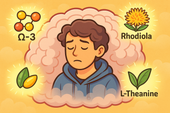
Brain Fog and Body Dysmorphic Disorder: Can Nootropic Supplements Help?
Brain fog often accompanies Body Dysmorphic Disorder, clouding focus and deepening emotional fatigue. Nootropic supplements like L-theanine, Rhodiola, and CoQ10 can help restore mental clarity, balance neurotransmitters, and bring calm energy back to the mind 🌿🧠.
-

How Stress Hormones Like Cortisol May Worsen Body Dysmorphic Disorder
Chronic stress floods the brain with cortisol — the hormone that keeps you on high alert. In Body Dysmorphic Disorder, this chemical overdrive fuels anxiety, distorts self-image, and traps the body in survival mode. Calming cortisol helps restore both peace and perspective 🌿🧠.
-

The Role of Neurotransmitters in BDD—and How Supplements May Help
Neurotransmitters like serotonin, dopamine, glutamate, and GABA shape how people with Body Dysmorphic Disorder perceive themselves. When these brain messengers fall out of balance, perception distorts — but targeted supplements can help restore calm, focus, and emotional regulation 🧠🌿.
-

What Is Body Dysmorphic Disorder? A Deeper Look at the Mind-Body Connection
Body Dysmorphic Disorder (BDD) isn’t just about appearance — it’s about perception. When brain chemistry, trauma, and stress distort self-image, the mind begins to see flaws that aren’t truly there. Healing starts by calming the nervous system and reconnecting mind and body 🪞🧠.
-
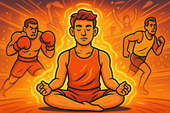
Keeping Calm in Competitive Sports: How to Train Your Mind, Body, and Chemistry for Peak Performance
Competitive pressure can overwhelm even the strongest athletes — but calm is trainable. By combining supplements like magnesium, L-theanine, and adaptogens with breathwork and mindset training, you can stay focused, balanced, and in control under any level of stress 🧠🏅.
-
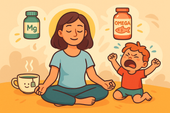
Supplements for Parents Facing Toddler Tantrums: Staying Calm When Little Emotions Run Wild
Toddler tantrums can drain even the most loving parent — but your calm is powerful. With the right supplements like magnesium, L-theanine, and ashwagandha supporting your nervous system, you can stay patient, grounded, and kind, even when emotions run high 🧸🌿.
-

Workplace Stress and Anger Management Support
Workplace stress can quickly turn into frustration — but calm is a skill you can train. By combining supplements like magnesium, L-theanine, and adaptogens with breathwork and mindset tools, you can stay focused, patient, and emotionally grounded no matter how intense the office gets 💼🌿.
-

How to Stay Patient With Family During Stressful Holidays
Holiday gatherings can stir up old stress and test your patience — but calm is possible. With nervous system support from magnesium, L-theanine, and adaptogens, plus mindful breathing and clear boundaries, you can stay centered, kind, and grounded even when family chaos unfolds 🎄💞.
-

Supplements to Keep Calm During Traffic Jams
Getting stuck in traffic doesn’t have to ruin your mood. With calming supplements like magnesium, L-theanine, and ashwagandha, you can train your body to stay relaxed and focused behind the wheel — turning gridlock into a moment of grounded patience 🚗🌿.
-
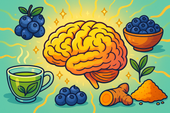
The Role of Antioxidants in Healing Brain Stress from Dissociation
Antioxidants protect the brain from the oxidative stress caused by trauma and dissociation. By neutralizing free radicals and supporting mitochondrial recovery, they help restore clarity, focus, and emotional balance — allowing the mind to heal at the cellular level 🌿🧠.
-
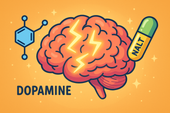
N-Acetyl L-Tyrosine (NALT) for Supporting Mental Clarity
N-Acetyl L-Tyrosine (NALT) fuels dopamine production — the neurotransmitter of focus and motivation. By supporting brain chemistry during stress, NALT helps restore mental clarity, energy, and alertness, making it easier to think clearly and feel present again ⚡🧠.
-

How Ginseng May Improve Focus and Energy in Dissociation
Ginseng helps combat the mental fatigue and fog that often come with dissociation. By supporting mitochondrial energy, balancing neurotransmitters, and regulating cortisol, it gently restores focus, motivation, and emotional presence — helping the mind reconnect with clarity and strength 🌿⚡.
-
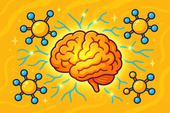
Phosphatidylserine and Dissociation: Supporting Cognitive Function
Phosphatidylserine helps calm the stress response by balancing cortisol, the body’s primary stress hormone. By lowering cortisol spikes, it protects memory, focus, and emotional stability — restoring clarity and mental presence for those struggling with dissociation 🧠🌿.
-
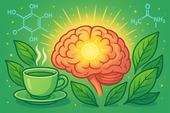
Can Green Tea Extract Help with Dissociative Brain Fog?
Green tea extract may help lift dissociative brain fog by supporting neurotransmitter balance, reducing inflammation, and enhancing energy at the cellular level. With its key compounds EGCG and L-theanine, it promotes calm focus, clarity, and emotional presence — helping you feel more alert and grounded 🍵🧠.

















































